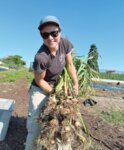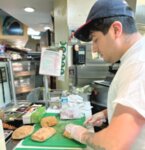Umbrellaed café tables and colorful sandwich-style signs announcing “We’re Open,” and “Weavers Way Co-op - Food for All” frame the sidewalk in front of the co-op’s new Germantown grocery store.
Inside a rented space adjacent to the store, Jon Roesser, the co-op’s general manager, sits at a folding table rattling off the store’s projected versus actual budget, its transactions, and other statistics with the enthusiasm of a kid reeling off his favorite baseball player’s batting average, RBIs, and home runs. If the grocery …
This item is available in full to subscribers.
You can also purchase this individual item for $1.50
We have recently launched a new and improved website. To continue reading, you will need to either log into your subscriber account, or purchase a new subscription.
If you are a digital subscriber with an active subscription, then you already have an account here. Just reset your password if you've not yet logged in to your account on this new site.
If you are a current print subscriber, you can set up a free website account by clicking here.
Otherwise, click here to view your options for subscribing.
Please log in to continue |





Umbrellaed café tables and colorful sandwich-style signs announcing “We’re Open,” and “Weavers Way Co-op - Food for All” frame the sidewalk in front of the co-op’s new Germantown grocery store.
Inside a rented space adjacent to the store, Jon Roesser, the co-op’s general manager, sits at a folding table rattling off the store’s projected versus actual budget, its transactions, and other statistics with the enthusiasm of a kid reeling off his favorite baseball player’s batting average, RBIs, and home runs. If the grocery business had the equivalent of baseball’s Rookie of the Year award, Weavers Way Germantown would be a contender.
“We budgeted for the store to do $125,000 a week in sales, and we’re doing between $145,000 and $165,000,” he says of the store that opened on May 15. “Our original pro forma had us doing about 650 transactions a day, and we’re doing 725 to 750 a day. We anticipated a 20% drop in our sales in Mt. Airy just because of migration. But that drop has only been about 16%.”
Roesser has good reason to be proud. Weavers Way is much more than just another grocery business. It’s a cooperatively-owned organization that buys 35 percent of what it sells from local producers. Under his leadership, it has become a cornerstone of Northwest Philadelphia’s regional economy and a powerful engine for economic growth, flirting with $50 million in annual sales.
Take Germantown, a socioeconomically challenged neighborhood where the co-op has just opened its fourth store. According to Roesser, Germantown’s early success is better than expected, but it isn’t a complete surprise. While the neighborhood isn’t exactly a food desert, the co-op’s market studies showed a “food dollar leakage.”
“We knew from our market study data that so many people who live in Germantown were shopping outside the neighborhood,” says Roesser, 54. “They were going to City Line Avenue; they were going to Whole Foods down at the Art Museum; they were going to the burbs. They were spending their food dollars somewhere else.”
Feeding a local economy
The store, a former Acme Market, is strategically located on busy Chelten Avenue, has a small parking lot, and is within walking distance of the train station and more than a few apartment buildings. But the organic, locally grown, circular economy, cherry-on-top was the existing “critical mass“ of members living in the neighborhood.
“We are excited to now be part of this historical, diverse, cool neighborhood that is part of the history of Philadelphia and Northwest Philadelphia in particular,” Roesser says. “It feels like we belong here.”
In a way, cool, diverse, and historical is a pretty good definition of Weavers Way.
Members of the environmentally conscious co-op come from a variety of neighborhoods but their shared values — selling organic and free trade products, supporting fair wages, animal rights and diversity and buying from local producers — make them a community.
Not needing to satisfy stockholders’ profit motives helps the community aspire to those values.
“No one is looking for a two percent return on sales from Weavers Way,” says Roesser. “As long as we can run our business in a fiscally responsible way, we don’t have to turn a profit back to investors.”
It’s been that way since the co-op’s beginning, when Jules Timerman ran a pre-order buyer’s club from the basement of a Mt. Airy church. According to the Weavers Way website, while Timerman drove around the neighborhood selling apples from the back of his station wagon, he talked up the idea of a co-op. Eventually, he convinced enough people to toss in $10 apiece, and on January 13, 1973, Weavers Way opened.
“Back in the early days, we were trucking in boxes from farmers and whatever,” says Kathleen Casey, the co-op’s development director. “It was a very different operation.”
In those days, the co-op was a rowhouse turned claustrophobic, members-only grocery store. Products were stuffed into every nook and cranny, Casey says. It employed 65 people.
“Everything was so jammed in, and the turnover of product was fast,” Casey says. “We believe it is the highest sales per square foot store probably in the United States.”
Roesser joined Weavers Way as its human resource director in August 2008. That year, the co-op opened a second store in Chestnut Hill and dropped its members only policy.
“We serve a lot of passersby and didn’t want to turn away people who were looking to buy the things we were selling,” Casey says.
In August 2015, Roesser was named general manager. Two years later, Weavers Way opened its third store, in Ambler. Casey, then a member of the Ambler Food Co-op, recalls the group pitching an Ambler location when a space became available.
“We said, ‘Hey, there is an existing building. You want to try operating a grocery in a store instead of a rowhome,’” she remembers. “It took them time, but Weavers Way was already having internal conversations about expansion.”
The co-op that started 51 years ago in a church basement now has four stores – Germantown, Mt. Airy (the Mothership), Chestnut Hill, and Ambler - 12,900 members, and more than 365 employees. It also operates two farms – Henry Got Crops at Saul High School in Roxborough, and Mort Brooks at Awbury Arboretum in Germantown – and an orchard which last year yielded 56,909 pounds of vegetables and fruit.
“We’ve grown a lot, but I always remind everybody that we are still a very small concern compared to the big corporations out there,” Roesser says. “The one thing that hasn’t changed is that we remain a consumer co-op. Our business model is fundamentally different than anyone else who is going to sell you groceries.”
That business model features the whopping 35% of its $50 million in sales from products grown or made by local farmers, coffee roasters, bread makers, and other small vendors.
“That’s off the charts,” Roesser says. “No one can touch us when it comes to supporting local food growers and local food producers.”
By local, Roesser means within 150 miles of City Hall in what he calls the “Philadelphia food shed.” The region is blessed with a green belt of farms stretching from the city out to Lancaster County, Northern Delaware, Southern New Jersey, and the city’s four collar counties.
“There is a bounty of farmers growing food, orchards, cheese makers, you name it,” he says, sounding like that kid ticking off his favorite player’s stats. “You asked what our mission is, what is fundamental to what we do? It’s linking value-driven consumers with these local food growers and producers. We serve as the connective, the critical link.”
Supporting local farmers and businesses helps create a circular economy, Roesser says. For instance: To fix a leaky roof, the co-op hires and pays a fair wage to a local roofer. The roofer hires and pays a fair wage to a plumber to fix a leaky faucet. The plumber needs groceries and shops at Weavers Way.
“So there is less profit being leached out of the region,” Roesser explains.
subhead
Weavers Way has helped several local, small vendors launch businesses. In 2012, Pete Merzbacher, founder, owner, and head baker of Merzbacher’s of Germantown started baking bread in his West Philadelphia home when he was all of 23 years old. For a subscription of $25 a month, he delivered freshly baked bread every week to subscribers at a predetermined location.
One day, Merzbacher loaded up a Rubbermaid tote with bread and boarded a regional rail train to Chestnut Hill where he met a Weavers Way grocery manager. When the meeting ended, Merzbacher had his first big client. At the time, he was making 100 pounds of bread a week. Today, he and 25 employees bake 11,000 pounds weekly for 150 customers.
“I love them for a number of reasons,” Merzbacher says. “It begins with the chance they took on me.”
But he also loves Weavers Way for living its values and principles.
“Weavers Way is what Weavers Way does, which is buy local and minimize waste,” he says. “They really believe in local vendors. It’s actually woven into the DNA of Weavers Way that they care about the regional economy.”
It’s a sentiment shared by Nikisha Bailey and Matthew Nam, owners of Win Win Coffee in Kensington. Bailey and Nam found that many of the coffee growers were being exploited by middlemen and brokers. The duo developed relationships with several growers and today import their coffee beans directly from the farmers.
“It’s good when you don’t have to explain why we are doing what we are doing,” Bailey says. “It’s almost like it is expected of producers to be trying to make an intentional good in the world, having an impact of change in the world.”
Still, 65% of the products at Weavers Way are not locally sourced, some seemingly even in opposition to the co-op’s stated values. Roesser readily agrees that a shopper can find plenty of products in the stores that may compromise their values, like blueberries in January.
“We operate the co-op in a triple bottom line so that all of our business decisions make good financial sense for the organization and make sense for the communities that we serve and make sense for the planet,” he says. “There is a certain amount of friction among those bottom lines. When we can make a business decision that checks all three of those boxes, then we feel we have made a decision that is very much aligned with our values. ”
And that means to be a full-service, year-round grocery store, Weavers Way must have, among other things, blueberries on the shelf in January. Members want them, and the bottom line is, the co-op exists to meet the needs of its members.
“I always tell everyone that we tend to overcomplicate things,” he says. “The best thing anybody ever said ever was, ‘It's better for everyone when it’s better for everyone.’ That’s Eleanor Roosevelt and it’s brilliant and, I believe, crystalizes our mission and the reason we exist.”